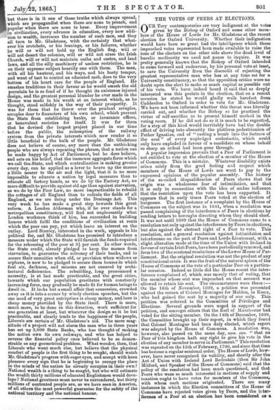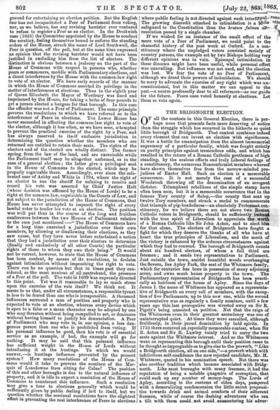THE VOTES OF PEERS AT ELECTIONS.
OUR Tory contemporaries are very indignant at the votes given by the Bishop of Oxford and some other mem- bers of the House of Lords for Mr. Gladstone at the recent
election for Oxford University. Whether their indignation would have been so great had the intelligence which these
impeached votes represented been made available to raise the tone of the electors on the other side above the dead level of bucolic mediocrity we need not pause to inquire. It was pretty generally known that the Bishop of Oxford intended to come forward and endeavour, by his personal vote at least, to save the University from the discredit of rejecting the greatest representative man who has at any time sat for a University constituency, so that the opposition critics were no doubt upon the alert to make as much capital as possible out of his vote. We have indeed heard it said that so deeply interested was this prelate in the election, that on a recent occasion he stated he would gladly walk barefoot front Cuddesdon to Oxford in order to vote for Mr. Gladstone. We have not been informed whether this threat was literally carried out, and whether the Bishop so far practised the virtue of self-sacrifice as to present himself unshod in the: voting room. If he did not do so it is much to be regretted, for a step of this kind would inevitably have had the double effect of driving into obscurity the platform pedestrianism of Father Ignatius, and of "casting a bomb into the fortress of the soul " of every unpledged ecclesiastic, which could only have exploded in favour of a candidate on whose behalf so sharp an ordeal had been gone through.
A popular impression prevails that a Peer of Parliament is not entitled to vote at the election of a member of the House of Commons. This is a mistake. Whatever disability exists arises solely from the good feeling and respect which members of the House of Lords are wont to pay to the expressed opinions of the popular assembly. The history of the so-called disqualification of Peers shows that its origin was a wholesome fear of intimidation, and that it is only in connection with the idea of undue influence that the restriction upon the vote has been supported. It appears that in early times Peers voted at the election of burgesses. The first instance of a complaint by the House of Commons on the subject was in 1641, when a resolution was passed complaining of the interference of Peers in elections by sending letters to boroughs directing whom they should elect. It was not until 1699 that the House of Commons came to a resolution not only against the interference by Peers in elections, but also against the abstract right of a Peer to vote. This resolution, and a general resolution against intimidation and interference on the part of Peers and Lords-Lieutenant, with a slight alteration made at the time of the Union with Ireland in favour of certain Irish Peers, have been periodically renewed, and form two of the sessional resolutions of the Lo wer House of Par- liament. But the original resolution was not the product of any constitutional crisis. It was the fruit of the natural spleen of the House of Commons at the vote of a particular Peer on a particu- lar occasion. Indeed so little did the House resent the inter- ference complained of which was merely that of voting, that the member whose seat was impeached on that account was allowed to retain his seat. The circumstances were these :- On the 16th of November, 1699, a petition was presented against the return of Colonel Montague for Malden, in Essex, who had gained the seat by a majority of one only. This petition was referred to the Committee of Privileges and Elections. Several grounds were urged in support of the petition, and amongst others that the Earl of Manchester had voted for the sitting member. On the 14th of December, 1699, the Committee brought up their report, in which they found that Colonel Montague had been duly elected, which report was adopted by the House of Commons. A resolution was, however, also passed on the same day, nem. con. " that no Peer of this kingdom bath any right to give his vote in the election of any member to serve in Parliament." This resolution was repeated on the 13th of February, 1700, and since that time has become a regular sessional order. The House of Lords, how- ever, have never recognized its validity, and shortly after the 'Act of Union with Ireland Lord Redesdale (then Sir John Mitford, and Speaker of the House of Commons) said that the policy of the resolution had been much questioned, and that
Peers who were so much interested in motions of supply and taxation ought to have votes for members of the Commonsi with whom such motions originated. There are many instances in which the Election committees of the House of Commons have rejected votes given by Peers, and the inter ference of a Peer at an election has been considered as' ground for entertaining an election petition. But the English law has not incapacitated a Peer of Parliament from voting, nor, as we believe, has any revising barrister ever ventured to refuse to register a Peer as an elector. In the Droitwich case (1835) the Committee appointed by the House to conduct the scrutiny, feeling themselves bound to enforce the standing orders of the House, struck the name of Lord South well, the Peer in question, off the poll, but at the same time expressed an opinion that the revising barrister would not have been justified in excluding him from the list of electors. The distinction is obvious between a jealousy on the part of the House of Commons with respect to persons who, whether peers or commoners, meddle with Parliamentary elections, and a direct interference by the House with the common-lacy right to vote of an elector. We have early records of the manner in which the House of Commons asserted its privilege in the matter of interferences at elections. Thus in the eighth year of Queen Elizabeth the Mayor of Westbury was fined and imprisoned by the House, for taking a bribe of four pounds to get a person elected a burgess for that borough. In this case the offender was not a Peer of Parliament. The same principle governs the resolutions to which we have referred as to the interference of Peers in elections. The Lower House has never succeeded in affecting the common-law right to vote of the elector, although it has often, as we have seen, attempted to prevent the practical exercise of the right by a Peer, and has always reserved to itself exclusive jurisdiction in determining the question whether the members who are returned are entitled to retain their seats. The rights of the electors and of the elected are wholly distinct. The former spring from the law of the land, and are exercisable while the Parliament itself may be altogether unformed, as in the case of a general election ; the latter give a privileged seat in the House of Commons to the elected, which may be properly cognizable there. Accordingly, ever since the cele- brated case of Ashby and White in 1704, where the right of an elector to sue the sheriff for refusing to receive and record his vote was asserted by Chief Justice Holt (whose decision was affirmed by the House of Lords) to be a right at the common law, cognizable in the Courts of Law, and not subject to the jurisdiction of the House of Commons, that House has never attempted to impeach the right of every lawful voter to tender his vote at an election. The position was well put thus in the course of the long and fruitless conferences between the two Houses of Parliament relative to the case just mentioned :—" The House of Commons have for a long time exercised a jurisdiction over their own members, by allowing or disallowing their elections, as they saw cause, but they have never before entertained a notion that they had a jurisdiction over their electors to determine (finally and exclusively of all other Courts) the particular rights of those to whom they owe their being." It would not be correct, however, to state that the House of Commons has been content, by means of its resolutions, to declaim against intimidation without impeaching the right to vote. There can be no question but that in times past they con- sidered, as the most noxious of all contraband, the presence of a Peer at the poll. The vote in 1619 Was expressly directed to this point. Yet was it reasonable to lay so much stress upon the exercise of the vote itself ? We think not. It seems to us that, under all circumstances, a responsible tyrant is less to be feared than one who is irresponsible. A thousand influences surround a man of position and property who is expected to vote at an election, whereas every device which is open to a false or a mean character may be adopted by one who may threaten without being compelled to act, or denounce without having himself to justify his denunciation. A Peer of Parliament who may vote is, in our opinion, a less dan- gerous person than one who is prohibited from voting. If his personal influence be good, then his vote is of essential service as an example, if bad, the example will go for nothing. It may be said that this personal influence has sufficient weight in the House of Lords without introducing it at the hustings. To which we would answer,—is hustings influence prevented by the present system ? How many resolutions of the House of Com- mons would it take to prevent the nominee of the Mar- quis of Lansdowne from sitting for Calne? The position of this and other boroughs is due to the natural influence of property, and it is idle to expect a resolution of the House of Commons to counteract this influence. Such a resolution may give a tone to elections generally which would be sufficiently given by public feeling if left to itself, but we question whether the sessional resolutions have the slightest effect in preventing the real interference of Peers in elections 01.3' ettc pul-Tenc
The growing discredit attached to intimidation is a 1 where public feeling is not directed against such interfe
safeguard to the Constitution than the brutum fulmen I5P-7" 4 resolution passed by a single chamber.
If we wished for an instance of the small effect of the mere vote of a Peer of Parliament, we could point to the shameful history of the past week at Oxford. In a con- stituency where the unpledged voters consisted mainly of country parsons, the example set by two Bishops holding very different opinions was in vain. Episcopal intimidation in these dioceses might have been useful, while personal effort was unavailing. But influence was not used, and the election was lost. We fear the vote of no Peer of Parliament, although we dread their powers of intimidation. We should be sorry to advocate the exercise of any right which was un- constitutional, but in this matter we can appeal to the past—a course professedly dear to all reformers—as our guide for the future. Peers once voted honestly at elections. Let them so vote again.































 Previous page
Previous page